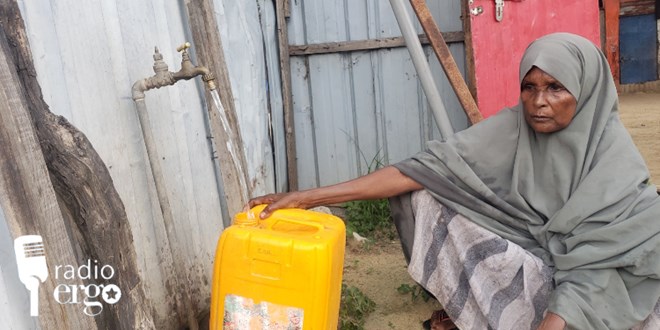
Thursday July 17, 2025

Khadiijo fetches water from a newly installed tap in her home/Mohamed Khadar/Ergo
Khadija Dahir Mahmoud and her five children now have access to free, clean water and their first toilets in Warcaasho internal displacement camp, in Mogadishu’s Deynile district, thanks to work completed by a Somali organisation.
A total of 1,100 households have benefited from free water connections, construction of latrines, and solar lighting installed by Nomadic Assistance for Peace and Development (NAPAD) across 10 IDP camps since January. These families, displaced from Lower and Middle Shabelle, previously faced severe water shortages.
Khadija, 60, stated that her struggles to find water, safe sanitation, and house lighting that enhances security have been eased.
“We had nowhere to go to relieve ourselves, no toilets at all. We just went together to far places and hid under trees. While we were in that desperate state, this organisation came, dug latrines and built toilets for us, and provided water.
We didn’t have water before and had to beg for three litres from those places, which isn’t enough for a family. Now we can wash our clothes, and the solar lights are on so our hut is now illuminated,” she told Radio Ergo.
She no longer carries water for two kilometres or begs from neighbours. They also received jerrycans and hygiene materials.
However, food scarcity persists, as Khadija raised her children alone and doesn’t have work due to her age and unfamiliarity with the city.
Displaced from Runirgod in December 2024, after conflict destroyed her two-hectare maize, bean and sorghum farm, the family struggles despite improved sanitation.
“Our situation is very bad and we are completely poor. We have nothing in our hands, and there’s nowhere to find work. One of my sons goes out to town to do shoe-shining work. If he brings half a dollar, we buy half a kilo of rice and 3,000 [Somali shillings worth of] sugar with that half dollar, and that’s what we eat at night. During the day, we just go without food. And I am an elderly person, 60 years old; I can’t do anything,” Khadija explained.
Her 18-year-old son faces bullying whilst hustling for shoe shining work: “Sometimes he comes back with nothing and says he didn’t find anything and that stronger children beat him and scattered his tool. So now we have latrines, we have solar lights, we have water – but what we don’t have is food and jobs to earn an income,” she stated.
Anab Hassan Omar, 70, with leg disabilities, gained a special-needs latrine and solar lights enhancing night safety for her in Alla Magan camp.
“A very good latrine was built for me. I am lifted and taken to the latrine. Before I didn’t have a latrine to go to. When I needed to go, either a bucket was brought for me or I was placed on a specially crafted chair to help me relieve myself. The new toilet has been built inside my house. Before the latrine was dug for us, we suffered,” Anab said.
Malnourished and diabetic, she eats whatever is available. Her blind husband and two sons live with her, while her six other children live elsewhere and face their own struggles so can’t help her.
“Our life depends on begging from relatives. I say brother, please give me something – and if someone finds something for me, it is brought to me. If not, I just stay without. I have nowhere to
go, and I don’t beg. Begging is shameful, but mobile phones are an easy way to say, please give me something,” she stated.
Displaced from Qoryoley in 2020 after losing her three-hectare vegetable farm to drought and conflict, Anab survives through phone appeals and kind people who sometimes give her food.
NAPAD officer Abdirahim Adan explained that the project – funded by the Somalia Humanitarian Fund (SHF) – aimed to alleviate hardships for new arrivals in the camps.
“The camps had very extensive needs. Among the changes are provision of clean latrines reducing the spread of disease, solar lights increasing security, and special latrines for people with disabilities,” he said.
The initiative has provided 53 latrines, eight of them disability-adapted; 424 solar lights; and hygiene kits across the camps.